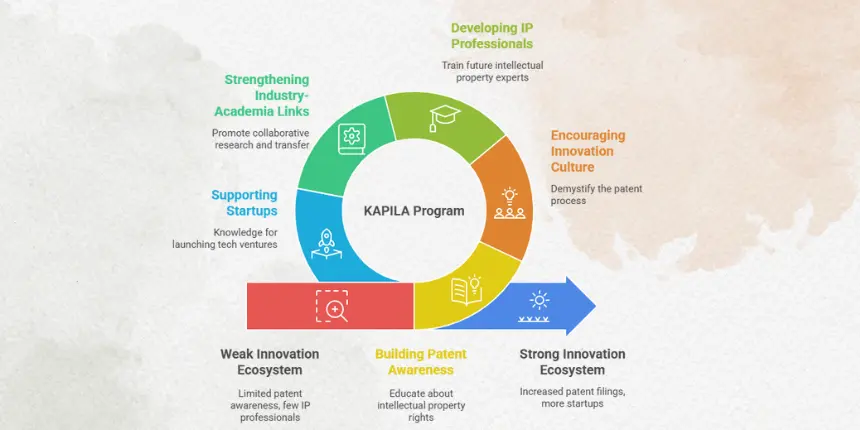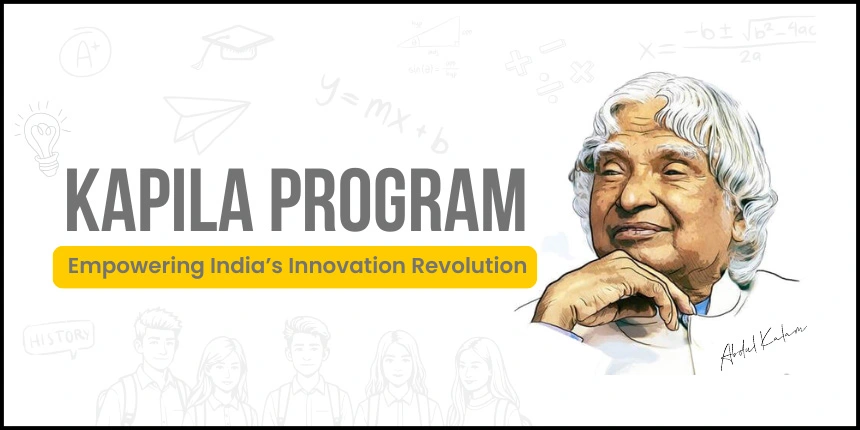India is rapidly emerging as a hub for innovation, research, and technology. To accelerate this journey, the government introduced the KAPILA Program (Kalam Program for Intellectual Property Literacy and Awareness). This initiative is designed to educate students, researchers, and innovators about the significance of patents and intellectual property rights (IPR), ensuring that their creative ideas are safeguarded and transformed into impactful innovations.
Many brilliant minds across the country come up with unique ideas, but often lack the knowledge of how to protect, patent, or commercialise them. Without proper awareness, such innovations either remain untapped or risk being misused. The KAPILA Program bridges this gap by spreading patent literacy and nurturing a culture of innovation within educational institutions.
Launched by the Department for Promotion of Industry and Internal Trade (DPIIT) and managed by the Office of the Controller General of Patents, Designs & Trade Marks (CGPDTM), the program represents a bold step towards strengthening India’s intellectual property ecosystem.
For students, faculty, and researchers who find patents complex, KAPILA makes the process simple and accessible. By linking intellectual property knowledge with career growth and entrepreneurship, the program empowers young innovators to confidently contribute to India’s innovation revolution.
What is the KAPILA Program?
The KAPILA Program stands for Kalam Program for Intellectual Property Literacy and Awareness. It is named after former President Dr. A.P.J. Abdul Kalam, who was a strong supporter of science, innovation, and youth empowerment.
The program’s main goal is to spread awareness about patents and intellectual property (IP) among students and researchers in higher education institutions across India. Instead of looking at patents as difficult legal terms, KAPILA explains them as useful tools that help protect ideas, support innovation, and boost economic growth.
Through this initiative, students don’t just learn the theory of intellectual property. They also gain practical knowledge—such as how to spot patentable ideas, check existing patents (prior art searches), and even draft patent applications. This way, the program makes patents simple, accessible, and directly useful for innovators.
Kapila Program Highlights
| Aspect | Details |
| Full Name | Kalam Program for Intellectual Property Literacy and Awareness |
| Launch Year | Part of India’s ongoing innovation initiatives |
| Ministry | Ministry of Education, Government of India |
| Primary Focus | IP awareness, innovation, and commercialisation |
| Target Institutions | Universities, colleges, and research centres |
| Key Benefits | Training, funding, mentorship, and industry collaboration |
| Geographic Reach | Pan-India coverage with over 200 participating institutions |
| Main Outcomes | Increased patent filings, startup creation, and research quality |
How to Apply for the KAPILA Program: Step-by-Step Guide
Who Can Apply: Open to students, researchers, entrepreneurs, professionals, and government officials. Institutions and companies can also join.
Application Process: Apply online through the official KAPILA portal by filling out a simple registration form.
Selection: Applications are reviewed based on background, role, and how IP knowledge can help in their work.
Program Format: Options include short workshops, certification courses, and mentorship programs—offering flexibility for various schedules.
Certification: On completion, participants get an official certificate that adds value to their careers and is recognised by employers and institutions.
Objectives of the Program

KAPILA pursues several interconnected objectives designed to strengthen India’s innovation ecosystem:
Building Patent Awareness: The program educates students and faculty about intellectual property rights, enabling them to understand how patents protect innovations and generate economic value.
Encouraging Innovation Culture: By demystifying the patent process, KAPILA encourages more individuals to pursue innovative research and development activities.
Developing IP Professionals: The initiative trains future intellectual property professionals who can support India’s growing innovation economy.
Strengthening Industry-Academia Links: KAPILA facilitates connections between educational institutions and industry partners, promoting collaborative research and technology transfer.
Supporting Startups and Entrepreneurship: Students gain practical knowledge about protecting their innovations, essential for launching successful technology-based ventures.
Key Features of the KAPILA Program
The program employs multiple delivery methods to maximise its impact across diverse educational settings:
Comprehensive Training Modules: KAPILA offers structured courses covering patent basics, search techniques, application processes, and commercialisation strategies. These modules adapt to different academic levels and disciplines.
Expert Faculty Development: The program trains faculty members to become intellectual property ambassadors within their institutions, ensuring sustainable knowledge transfer.
Practical Workshops: Hands-on sessions allow participants to work with real patent databases, conduct searches, and practice drafting patent claims under expert guidance.
Online Resources and Tools: Digital platforms provide accessible learning materials, including video tutorials, case studies, and interactive exercises that students can access anytime.
Industry Partnerships: Collaborations with companies and patent attorneys expose participants to real-world intellectual property challenges and career opportunities.
Recognition and Certification: Participants receive certificates acknowledging their intellectual property knowledge, valuable for career advancement and further studies.
Impact and Achievements So Far
Since its launch, KAPILA has demonstrated significant success in transforming India’s intellectual property landscape:
Wide Institutional Reach: The program has engaged hundreds of educational institutions across India, from premier engineering colleges to regional universities, ensuring broad geographic coverage.
Student Participation: Thousands of students have completed KAPILA training, with many subsequently filing patent applications or pursuing careers in intellectual property.
Faculty Empowerment: Trained faculty members continue spreading intellectual property awareness within their institutions, creating a multiplier effect that extends the program’s reach.
Patent Filing Increases: Participating institutions report notable increases in patent applications filed by students and faculty members following KAPILA implementation.
Startup Support: Many KAPILA graduates have launched technology startups, using their intellectual property knowledge to protect and commercialise their innovations effectively.
Benefits for Students and Institutions
KAPILA participation offers substantial advantages for both individual learners and educational institutions:
Enhanced Career Prospects: Students with intellectual property knowledge enjoy competitive advantages when pursuing careers in technology, research, or entrepreneurship. Many employers specifically value candidates who understand patent processes.
Research Excellence: Faculty members trained in patent searching conduct more thorough literature reviews, avoiding duplication and identifying genuine innovation opportunities.
Commercialisation Opportunities: Institutions with strong intellectual property awareness generate more revenue through technology licensing and industry partnerships.
Innovation Recognition: KAPILA-trained researchers better understand how to document and protect their innovations, leading to increased patent filings and recognition.
Global Competitiveness: Understanding international patent systems helps Indian innovators compete effectively in global markets.
Current Status in 2025–26
The KAPILA Program continues expanding its reach and impact through enhanced digital delivery methods and strategic partnerships:
Digital Learning: Online platforms deliver KAPILA courses for a wider reach, including rural areas.
Specialised Tracks: New focus areas like biotechnology, IT, and clean energy.
Global Collaboration: Partnerships with international IP offices for exposure to global systems.
Advanced Training: Modules on patent analytics, FTO (freedom-to-operate), and IP strategy.
Government Integration: Linked with other innovation programs to boost overall impact.
How to Get Involved?
Educational institutions and individuals can participate in KAPILA through several pathways:
Institutional Registration: Colleges and universities can register to become KAPILA centres, receiving training materials, expert support, and certification authority.
Faculty Training Programs: Academic staff can attend specialised workshops to become certified KAPILA instructors within their institutions.
Student Enrollment: Individual students can join KAPILA courses offered at participating institutions or through online platforms.
Industry Partnerships: Companies can collaborate with KAPILA centres to provide internships, case studies, and real-world project opportunities.
Government Coordination: State governments and educational boards can integrate KAPILA components into their innovation and entrepreneurship initiatives.
FAQs
1. Who can participate in the KAPILA Program?
KAPILA welcomes students from all disciplines, faculty members, researchers, and professionals interested in intellectual property. While engineering and science students form a large participant base, the program benefits anyone involved in innovation or research activities.
2. Is there any cost for KAPILA participation?
Most KAPILA training is provided free of charge as part of the government’s commitment to promoting intellectual property awareness. Some advanced or specialised modules may involve nominal fees to cover materials and certification costs.
3. How long does KAPILA training take?
Basic KAPILA courses typically require 20-30 hours of study time, spread over several weeks. Advanced modules may require additional time commitment. The flexible structure allows participants to progress at their own pace while maintaining quality standards.
Also Read:




